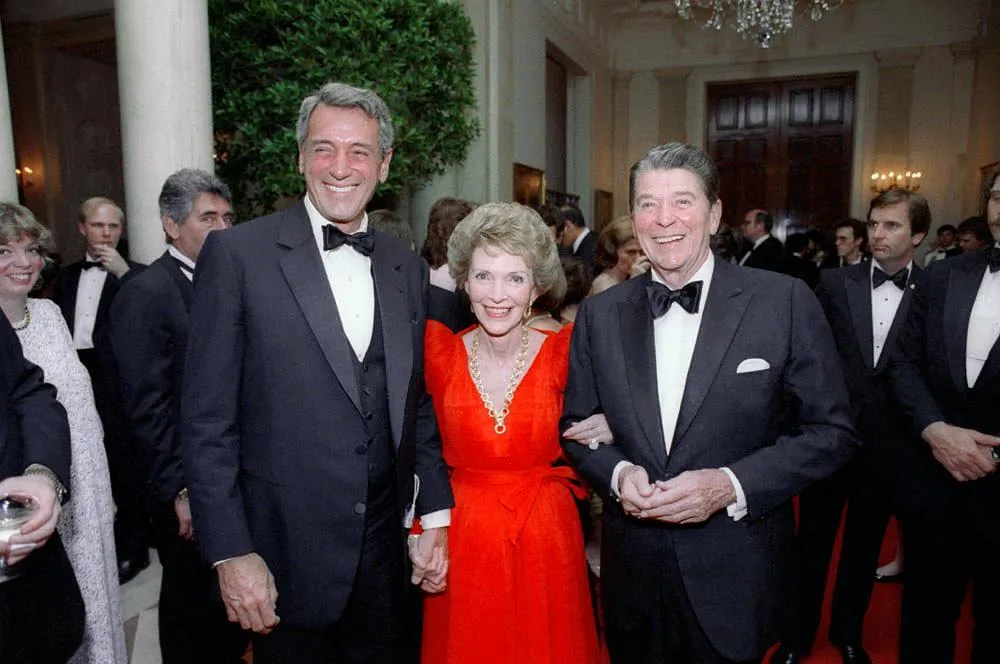The Hollywood Star Who Confronted the AIDS ‘Silent Epidemic’
Rock Hudson died of AIDS-related complications in 1985
/https://tf-cmsv2-smithsonianmag-media.s3.amazonaws.com/filer/85/f0/85f0e004-1b5c-4173-bce1-d32f1969d209/hudson.jpg)
Before Rock Hudson announced he was dying of complications caused by HIV-AIDS, he’d never even publicly come out as gay.
Hudson’s death, which occurred on this day in 1985, was the first time a well-known U.S. celebrity had died of AIDS-related complications. In the last period of his life he went public with his diagnosis, which at the time effectively meant coming out as gay, a move he had avoided for his whole career.
“With leading-man good looks, Hudson starred in numerous dramas and romantic comedies in the 1950s and 60s, including Magnificent Obsession, Giant and Pillow Talk,” writes History.com. “In the 1970s, he found success on the small screen with such series as McMillan and Wife.”
Throughout his career, Hudson’s public-facing image was robustly heterosexual, a reflection of the homophobia and career consequences he would have faced in coming out. This stigma may have also shaped his decisions after finding out he had AIDS in June 1984, according to People journalist Scot Haller, who wrote on Hudson’s life and death in October 1985. "For Hudson, his longtime desire for secrecy about the fact that he was gay likely was only reinforced by the anti-gay sentiments that the advent of AIDS raised," writes Chris Geidner for Buzzfeed.
After his diagnosis, Hudson sought AIDS treatment in Paris, where HPA-23, an early retroviral, was available. AIDS care in the United States remained primitive and the Reagan administration had recently reduced funding to AIDS-related research and care, writes Geidner.

However, by 1985 Hudson was too weak to continue treatment. He made the decision to announce that he had AIDS.
“The hardest thing I ever had to do in my life was to walk into his room and read him the press release,” publicist Yanou Collart, who worked with Hudson in Paris, told Haller. “I’ll never forget the look on his face. How can I explain it? Very few people knew he was gay. In his eyes was the realization that he was destroying his own image.”
The news made headlines across the country. In 1985, there were few "out" gay public figures. When Hudson announced he had it, President Ronald Reagan had yet to publicly say the word AIDS, something he finally did in September of that year. For one of the Hollywood's iconic leading men to announce he was gay and had AIDS was a clear gamechanger, writes Geidner. In his 1987 book on the AIDS epidemic, journalist Randy Shilts wrote that AIDS in the United States could be divided into two distinct phases: "There was AIDS before Rock Hudson and AIDS after."
As Geidner writes, there was also a personal connection between Hudson's story and the Reagans. The year before, Nancy Reagan had declined to help Rock Hudson get the treatment he needed at the Paris hospital–despite the fact that Hudson had been a longstanding Reagan supporter and was personally known to the couple.
Hudson's announcement changed the American perspective on AIDS, but it had also been shaped by it. At the same moment the nation found out he was dying, Hudson's romantic partner Marc Christian also believed he had received a death sentence. Hudson didn't tell Christian after he was diagnosed and the two continued living together: Christian found out from the same news broadcasts that told everyone else. “I thought I was a dead man,” he said later, according to Elaine Woo for the Los Angeles Times.
Christian was right to fear: By 1985, at least thousands of Americans had already died in the United States as part of the AIDS epidemic, according to The New York Times.
Testing revealed Christian was HIV-negative, but he sued Rock Hudson’s estate saying that the star “knowingly exposed him to AIDS.” He won the suit. It's another complicated facet of the horrifying and painful tale of the 1980s AIDS epidemic, which was shaped by homophobia, moral panics and a slow-to-act administration. Hudson’s decision to go public with his diagnosis did “help elevate the urgency of the epidemic,” writes Carmel Dagan for Variety, “even if it didn’t immediately end some of the hysteria and stigma surrounding AIDS. What it did do is usher in a greater focus on fundraising for AIDS charities and government funding for research.”